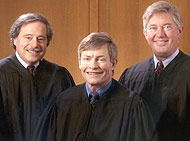11/15/2011
Alaska Appeals Court Upholds BurnoutsA little bit of burnout is acceptable to the second highest court in Alaska.

Drivers cannot be pulled over if they peel out from an intersection with a bit of tire squeal, Alaska's second-highest court ruled Thursday. In countries like Australia, a similar chirp of the tires could lead to the impounding of the vehicle under "anti-hoon" laws that generate millions in revenue. A three-judge panel in The Last Frontier was more forgiving when considering the fate of Vernon Burnett who was pulled over after midnight on September 20, 2009.
Alaska State Trooper Lucas Altepeter saw Burnett's truck stop, then spin its tires one-third of the way through the intersection while turning left in the city of Bethel. Burnett made no driving errors, but Trooper Altepeter decided to stop him anyway, as he had "never seen somebody accidentally lose traction and spin their tires as fast and as far as this particular vehicle did." The trooper believed he could write a citation for the tire spinning alone. A district court judge agreed, saying the the spinning was sufficient proof of negligent driving. The appellate court sided with Burnett.
"Under (state law), a person commits the offense of negligent driving if they drive in a manner that creates an unjustifiable risk of harm to a person or to property, and if their conduct actually endangers a person or property," Judge David Mannheimer wrote for the court. "Altepeter did not assert that Burnett's driving endangered Burnett or anyone else, or that Burnett's driving put property at risk."
Prosecutors countered that spinning tires represented a potential threat to everyone on the road, and that the trooper had reasonable suspicion to effect a traffic stop, or issue a safety warning to the driver. The three-judge panel found this line of argument unpersuasive.
"A person can not be convicted of negligent driving for creating a theoretical or speculative danger," Mannheimer wrote. "The statute requires proof of actual endangerment."
The appellate court also rejected the safety warning concept as there was no evidence Burnett was pulled over because he needed assistance or because intervention was needed to protect the public. The last ditch effort of prosecutors was the claim that a peel out gives rise to the reasonable suspicion that the driver is intoxicated. No testimony was given to back up this claim. Similar claims have also been rejected in cases before the New Hampshire Supreme Court and the Texas Court of Criminal Appeals.
"Because we conclude that the traffic stop of Burnett's vehicle was unlawful, the evidence obtained as a result of this traffic stop must be suppressed," Mannheimer concluded. "And because the primary evidence of Burnett's impairment was obtained as a result of this traffic stop, Burnett's conviction for driving under the influence is reversed."
A copy of the decision is available in a 275k PDF file at the source link below.


